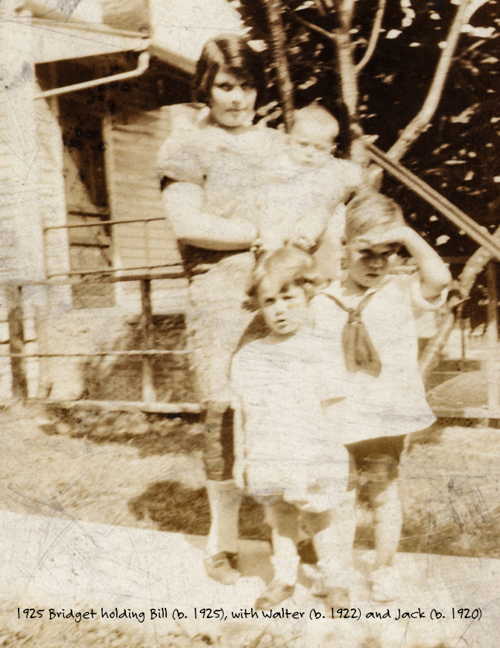
Mad in Pursuit Notebook
1928: Bridget Takes Charge
Another of my dad's contributions to the family lore of women being in charge of things
We sat talking over breakfast about his growing up during the Great Depression and began talking about his father’s business and his mother’s role in keeping everything afloat. I don’t know how much was first-hand knowledge, but my father was a close observer even as a small boy, when he prowled through his parents’ documents looking for (non-existent) proof that he was adopted.
His father Walter was a carpenter, from a family of carpenters who’d emigrated from England in 1884. They had a family business: WJ Price & Sons—Walter being one of the five sons.[1]
According to my dad, it was his grandmother Sarah who kept the business prospering. When she died in June 1927, business began circling the drain. It wasn’t that they didn’t have enough work; it was that they didn’t know how to collect the money. And the drinking began to escalate.
On Saturdays, the tradition was for father and sons to gather at the Aubert shop to make stock items like windows. But there was also a horseshoe pit and bottles of whiskey.
One Saturday in 1928, when Walter came home smelling of whiskey, his wife Bridget blew her stack.
Bridget had emigrated from Ireland. Her domestic work for the wealthy Whitelaw family refined her good taste and she found no nobility in being a pauper. Now, with three small children, she couldn't let the death of her mother-in-law throw her plans into chaos.
My father—only about six years old—vividly recalled the hell she raised.
Bridget got the last word: "Pick a brother," she said. "You're going into business with him."
On the following Monday, Bridget marched Walter off to the bank and they got another mortgage on the house [2]. They used the money to buy a truck and Walter recruited his younger brother Tab as his partner. With Bridget cracking the whip, Walter and Tab were quickly in the black and the mortgage was paid off.
That’s the way my father told it, anyway. He was biased toward strong, intelligent women—my good fortune.
*
Postscript. When I told this story in Tribe of the Breakaway Beads (2011), somehow I thought it occurred in 1936, when my dad was about fourteen. My Uncle Pat took issue with it. In 1936, he was five years old and would certainly have remembered a new truck. We let this question ride.
But recently, I found an entry in the 1929 St. Louis Polk-Gould Directory, under CONTRACTORS: Walter advertising his services from his home on Theodosia, separate from his father Wm J on Aubert.

This feels like evidence that the story was true, but happened at a much earlier time. The earlier time makes sense. It supports the rapid decline of the business after Sarah's death.
Of course, shortly, the Great Depression was upon them and all bets for business success were off. By April of 1930, Walter was working as a carpenter, not independently but as a wage-earner for a construction company.
I continue to love this story for its insight into role of clever women in keeping their talented husbands bringing home the bacon, even in the traditional society of the early twentieth century.
Notes
[1] There were six sons, but the eldest son Bill was not part of WJ Price & Sons. He worked elsewhere.
[2] Walter and Bridget purchased the house at 5642 Theodosia in 1924. According to my dad, it had been a goal of the family business that each son would be able to purchase a home of their own. Typically, in those days, houses were financed with a five-year mortgage. During their prosperous 1920s, they may have secured a shorter-term mortgage. Either that, or they took out a second mortgage.
Books from Mad in Pursuit and Susan Barrett Price: KITTY'S PEOPLE: the Irish Family Saga about the Rise of a Generous Woman (2022)| HEADLONG: Over the Edge in Pakistan and China (2018) | THE SUDDEN SILENCE: A Tale of Suspense and Found Treasure (2015) | TRIBE OF THE BREAKAWAY BEADS: Book of Exits and Fresh Starts (2011) | PASSION AND PERIL ON THE SILK ROAD: A Thriller in Pakistan and China (2008). Available at Amazon.